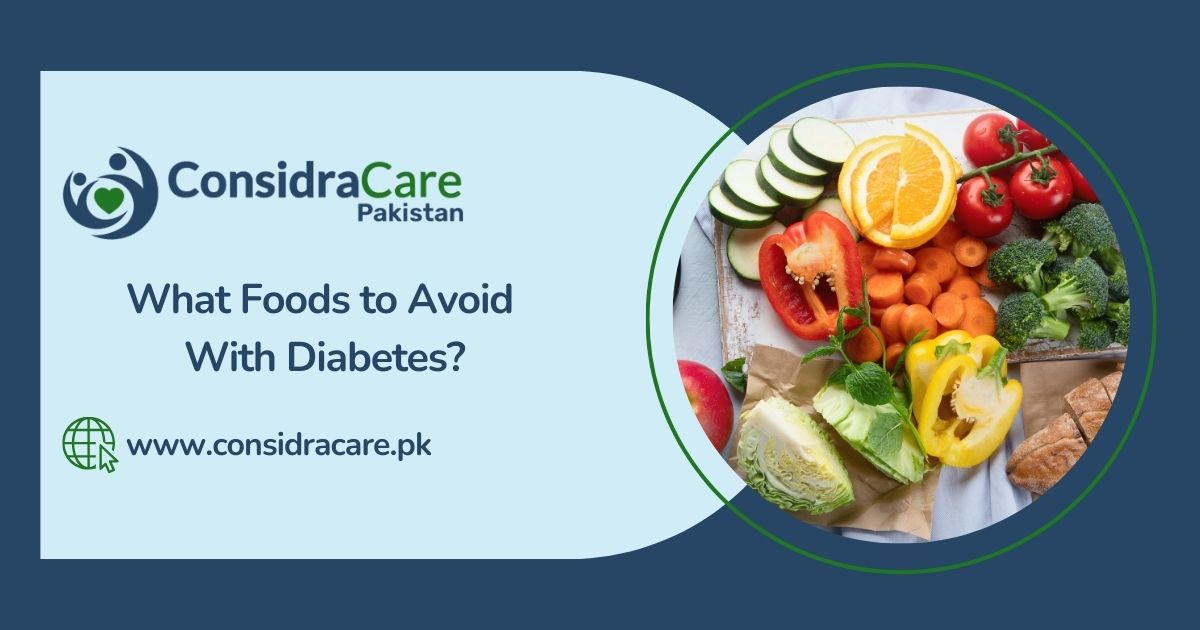Diabetes affects how your body processes sugar, making your daily food choices critical for long-term health. While no food is entirely off-limits, certain items—such as sugary treats, refined carbohydrates, and processed snacks—can make it more difficult to maintain stable glucose levels, increasing the risk of complications.
Managing diabetes involves more than just taking medication; your diet also plays a significant role. Some foods can cause quick spikes in blood sugar, impact insulin response, and heighten the risk of heart disease or weight gain.
Therefore, it is essential to pay attention to your diet and understand which foods to avoid with diabetes in order to maintain good health and control.
In this article, we will explore the primary foods to avoid when living with diabetes, their impact on your body, and healthier alternatives that support your health and lifestyle.
Foods to Avoid During Diabetes
Here are some common foods and drinks that people with diabetes should limit or avoid, as they can make sugar control more difficult and increase the risk of complications.
1. Sugary Drinks:
These beverages are high in added sugars and empty calories, resulting in rapid spikes in blood sugar without providing any nutritional benefits. This can lead to weight gain and poor diabetes control.
Examples: Sodas, fruit punches, sweetened teas, flavored coffees, energy drinks.
Better Choices:
- Opt for plain water, sparkling water, or unsweetened tea.
- Try fruit-infused water or lemon water for a natural flavor.
- Limit flavored coffee drinks and replace them with black coffee or a splash of low-fat milk.

2. Refined Carbohydrates:
Lacking fiber and nutrients, refined carbs break down quickly into glucose, causing sharp increases in blood sugar levels. Regular consumption can also contribute to weight gain and reduced insulin sensitivity.
Examples: White rice, white bread, naan, flour tortillas, packaged snacks, regular pasta, and sugary breakfast cereals.
Better Choices:
- Choose whole grains, such as brown rice, oats, quinoa, or whole wheat bread.
- Pair carbohydrates with protein or healthy fats to slow down the absorption process.
- Look for 100% whole grain or high-fiber options on labels.
3. Fried and Processed Foods:
Fried foods absorb excess oil during cooking, resulting in higher levels of saturated and trans fats, which can increase the risk of cholesterol, insulin resistance, and heart disease.
Examples: French fries, fried chicken, tempura, fried chips, deep-fried desserts.
Better Choices:
- Bake, grill, steam, or air-fry instead of deep frying.
- Use heart-healthy oils in moderation.
- Choose roasted vegetables or nuts as snacks instead of fried items.
4. Processed Meats:
These meats are high in saturated fats, sodium, and preservatives, which can raise blood pressure and increase the risk of heart disease—conditions often associated with diabetes.
Examples: Hot dogs, sausages, bacon, cold cuts, and pre-packaged lunch meats.
Better Choices:
- Select lean proteins such as grilled chicken, turkey, or fish.
- Include plant-based options like beans, lentils, or tofu.
- Prepare fresh meat at home instead of buying processed versions.
5. High-Fat Dairy Products:
Consuming high levels of saturated fats can lead to weight gain, clogged arteries, and increased heart risks, all of which are serious concerns for people with diabetes.
Examples: Whole milk, butter, cream, full-fat cheese, organ meats, poultry with skin, and fatty cuts of meat like ribs.
Better Choices:
- Choose skim or low-fat dairy products.
- Try plant-based alternatives like unsweetened almond, soy, or oat milk.
- Opt for lean cuts of meat and remove the skin from poultry before cooking.
6. Ultra-Processed Foods:
These foods typically combine refined carbs, added sugars, unhealthy fats, and high sodium. They can complicate diabetes management and may contribute to obesity, fatty liver disease, and insulin resistance.
Examples: Packaged snacks, cookies, sweetened cereals, fast food, and processed baked goods.
Better Choices:
- Focus on whole, minimally processed foods, such as fresh vegetables, fruits, nuts, and seeds.
- Prepare meals at home to control ingredients.
- Replace sugary snacks with healthier options such as yogurt with fruit or roasted chickpeas.
7. High-Sodium Foods:
Excess sodium can raise blood pressure and strain the heart, increasing the risk of stroke and heart disease in individuals with diabetes.
Examples: Pickles, canned vegetables with added salt, processed sauces, and salty snacks.
Better Choices:
- Opt for fresh or frozen vegetables that have not been flavoured with salt.
- Season meals with herbs, spices, garlic, or lemon instead of salt.
- Look for “low-sodium” or “no salt added” labels on packaged foods.
8. Alcohol:
Alcohol can affect liver function and may cause sugar levels to drop dangerously low, especially if consumed on an empty stomach. Sweet cocktails add extra sugars and calories that complicate glucose management.
Examples: Beer, sweet cocktails, sugary mixed drinks, and liquor with soda.
Better Choices:
- If approved by your doctor, drink only in moderation (1 drink per day for women, 2 for men).
- Never drink on an empty stomach.
- Choose lower-sugar options, such as dry wine or spirits mixed with soda water.

Best Foods for Diabetes
Here are some effective strategies for managing diabetes and maintaining a balanced lifestyle.
Read More: 4 Effective Diabetes-Friendly Diet Plans You Should Try
1. Fiber-Rich Carbohydrates:
High-fiber carbohydrates digest slowly, which helps prevent sudden spikes in glucose levels and keeps you feeling full for longer.
Examples: Whole grains, legumes, non-starchy vegetables, nuts, and seeds.
Benefits: Support steady blood sugar levels, aid digestion, and promote a healthy weight.
2. Lean Proteins:
Protein helps control hunger and supports muscle strength without causing sharp increases in glucose levels.
Examples: Skinless poultry, fish, eggs, tofu, beans, and lentils.
Benefits: Slows carbohydrate absorption, boosts energy stability, and reduces cravings.
3. Healthy Fats:
Unsaturated fats and omega-3 fatty acids play a crucial role in protecting heart health and enhancing insulin sensitivity.
Examples: Olive oil, avocado, nuts, seeds, and fatty fish.
Benefits: Lower cholesterol, reduce inflammation, and support brain function.
4. Fruits and Vegetables:
Fruits and vegetables are packed with vitamins, minerals, and antioxidants, making them essential for a diabetes-friendly diet.
Examples: Berries, citrus fruits, apples, spinach, kale, broccoli, and cruciferous vegetables.
Benefits: Provide antioxidants, fiber, and essential nutrients while being naturally low in calories.

5. Dairy and Probiotics:
Low-fat dairy products and probiotic foods can improve gut health and enhance metabolic control.
Examples: Plain yogurt with live cultures, kefir, cottage cheese, and fortified low-fat milk.
Benefits: Improve digestion, reduce insulin resistance, and support bone health.
6. Healthy Drinks:
Staying hydrated with the right beverages is just as important as consuming nutritious solid foods.
Examples: Water, unsweetened tea, black coffee, and sparkling water with lemon or cucumber.
Benefits: Helps prevent sugar spikes, supports hydration, and lowers the risk of diabetes.
Read More: 6 Tips to Avoid Dehydration During Ramadan
ConsidraCare’s Role in Supporting Healthy Living with Diabetes
Managing diabetes requires a balanced lifestyle that supports long-term health. At ConsidraCare, our caregivers support families by preparing meals suitable for individuals with diabetes, monitoring nutrition, and promoting healthier daily habits.
Conclusion:
Since each person’s body responds differently to food, creating a personalized meal plan that aligns with your lifestyle, activity level, and health goals is essential. A balanced, nutrient-rich diet not only supports healthy blood sugar levels but also helps protect your heart and improve overall well-being.
With the right guidance and support, managing diabetes becomes less overwhelming and more focused on building a sustainable, healthy lifestyle.
FAQs
1. Which foods should people with diabetes avoid?
People with diabetes should avoid sugary drinks, sweets, white bread, pastries, and processed foods, as these can cause rapid spikes in blood sugar levels.
2. Are vegetables harmful for diabetes?
While vegetables are generally healthy, it’s best to limit starchy vegetables such as potatoes, corn, and peas, as they can quickly raise blood sugar levels.
3. What are the warning signs of diabetes?
Common warning signs of diabetes include frequent urination, excessive thirst, fatigue, blurred vision, slow healing of wounds, and unexplained weight changes.
4. What is a good breakfast for people with diabetes?
A healthy breakfast for individuals with diabetes should include high-fiber and protein-rich foods, such as oats, eggs, whole-grain bread, and vegetables, to help maintain stable blood sugar levels.
5. How can you test for diabetes at home?
You can test for diabetes at home by using a blood glucose meter to check your sugar levels and monitor any unusual changes.



